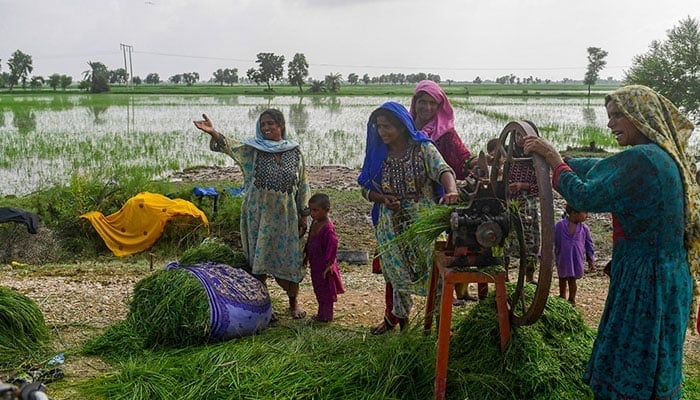Italy launches $4.4m climate resilience project for rural Sindh
ISLAMABAD: Italy on Friday signed a memorandum of understanding (MoU) with various organisations to implement a 36-month, $4.4 million project aimed at strengthening vulnerable communities facing climate-related risks in rural Sindh.
Funded by the Italian Agency for Development Cooperation (AICS), the 4 million euros (approximately $4.4 million) initiative seeks to build resilience among communities exposed to climate shocks through anticipatory action and sustainable adaptation measures.
The signing ceremony took place at the residence of Ambassador of Italy to Pakistan Marilina Armellin and was attended by representatives from the Food and Agriculture Organisation (FAO), CESVI, the Embassy of Italy, and AICS.
Over a three-year period, the project will support rural communities in Sindh -- one of Pakistan’s provinces most vulnerable to climate hazards such as floods, droughts and heatwaves -- by establishing multi-hazard early warning systems, improving water quality monitoring, and promoting climate-resilient livelihoods. It will also explore climate risk insurance and develop anticipatory action protocols at both provincial and district levels.
Armellin noted that the initiative aligns with Pakistan’s national priorities for climate adaptation and disaster risk reduction and complements Italy’s broader development cooperation strategy, which promotes sustainable agriculture and social inclusion.
FAO Representative in Pakistan Florence Rolle and CESVI’s Regional Manager for Asia Farhan A Khan, underscored the importance of proactive interventions. “As climate change continues to intensify the frequency and severity of disasters, early and anticipatory action is no longer optional -- it is essential,” they said.
The project will begin with a three-month inception phase to identify three target districts in Sindh, using a combination of climate vulnerability data, flood impact assessments, and poverty mapping. It will be implemented in collaboration with technical partners, including the Sindh Agriculture Department, Provincial Disaster Management Authority (PDMA), Sindh Irrigation and Drainage Authority (SIDA), Livestock and Irrigation Departments, the Sindh Social Protection Authority, and the Ministry of Climate Change and Environmental Coordination.
The initiative is aligned with both national and provincial policy frameworks, directly supporting Pakistan’s National Adaptation Plan (2023) and Sindh’s Climate Change Policy (2022), with a focus on enhancing institutional capacity and community preparedness to respond to climate-induced disasters.
-
 James Van Der Beek's Final Conversation With Director Roger Avary Laid Bare: 'We Cried'
James Van Der Beek's Final Conversation With Director Roger Avary Laid Bare: 'We Cried' -
 Jaden Smith Walks Out Of Interview After Kanye West Question At Film Premiere
Jaden Smith Walks Out Of Interview After Kanye West Question At Film Premiere -
 Michelle Obama Gets Candid About Spontaneous Decision At Piercings Tattoo
Michelle Obama Gets Candid About Spontaneous Decision At Piercings Tattoo -
 Why Halle Berry Wasn't Ready For Marriage After Van Hunt Popped Question? Source
Why Halle Berry Wasn't Ready For Marriage After Van Hunt Popped Question? Source -
 Bunnie Xo Shares Raw Confession After Year-long IVF Struggle
Bunnie Xo Shares Raw Confession After Year-long IVF Struggle -
 Brooks Nader Reveals Why She Quit Fillers After Years
Brooks Nader Reveals Why She Quit Fillers After Years -
 Travis Kelce Plays Key Role In Taylor Swift's 'Opalite' Remix
Travis Kelce Plays Key Role In Taylor Swift's 'Opalite' Remix -
 How Jennifer Aniston's 57th Birthday Went With Boyfriend Jim Curtis
How Jennifer Aniston's 57th Birthday Went With Boyfriend Jim Curtis -
 JoJo Siwa Shares Inspiring Words With Young Changemakers
JoJo Siwa Shares Inspiring Words With Young Changemakers -
 James Van Der Beek Loved Ones Breaks Silence After Fundraiser Hits $2.2M
James Van Der Beek Loved Ones Breaks Silence After Fundraiser Hits $2.2M -
 Disney’s $336m 'Snow White' Remake Ends With $170m Box Office Loss: Report
Disney’s $336m 'Snow White' Remake Ends With $170m Box Office Loss: Report -
 Travis Kelce's Mom Donna Kelce Breaks Silence On His Retirement Plans
Travis Kelce's Mom Donna Kelce Breaks Silence On His Retirement Plans -
 Premiere Date Of 'Spider-Noir' Featuring Nicolas Cage Announced
Premiere Date Of 'Spider-Noir' Featuring Nicolas Cage Announced -
 Pedro Pascal's Sister Reveals His Reaction To Her 'The Beauty' Role
Pedro Pascal's Sister Reveals His Reaction To Her 'The Beauty' Role -
 Kate Middleton Proves She's True 'children's Princess' With THIS Move
Kate Middleton Proves She's True 'children's Princess' With THIS Move -
 Paul Anka Reveals How He Raised Son Ethan Differently From His Daughters
Paul Anka Reveals How He Raised Son Ethan Differently From His Daughters




